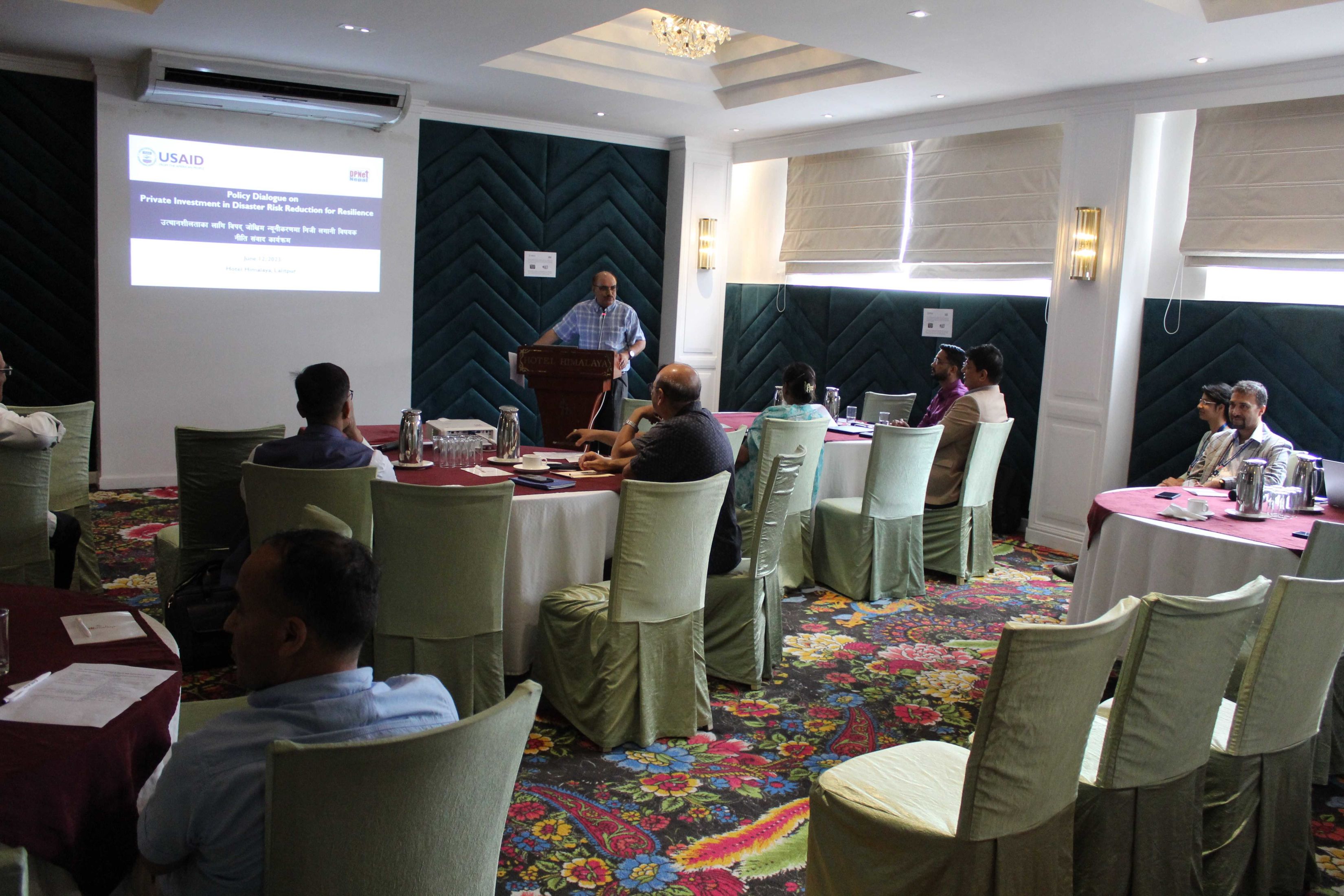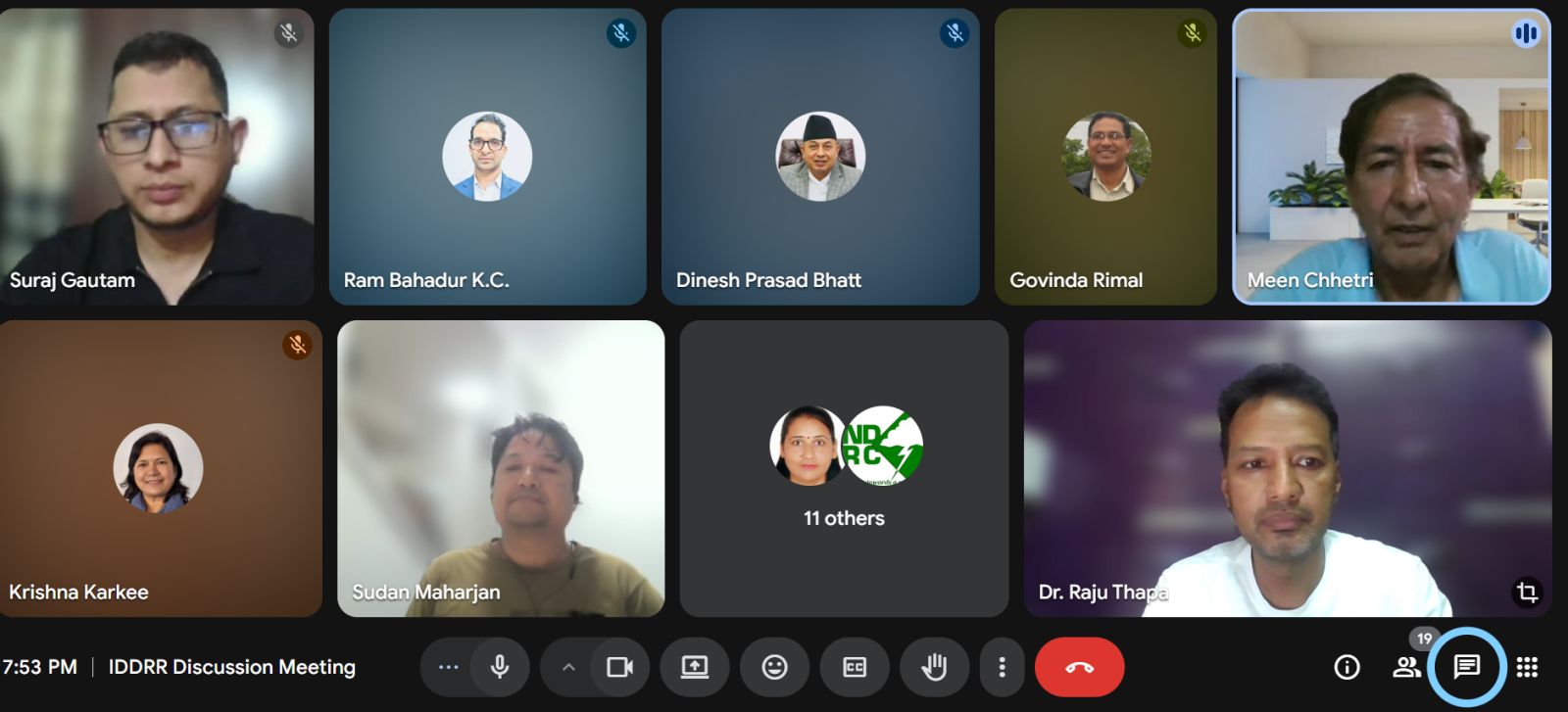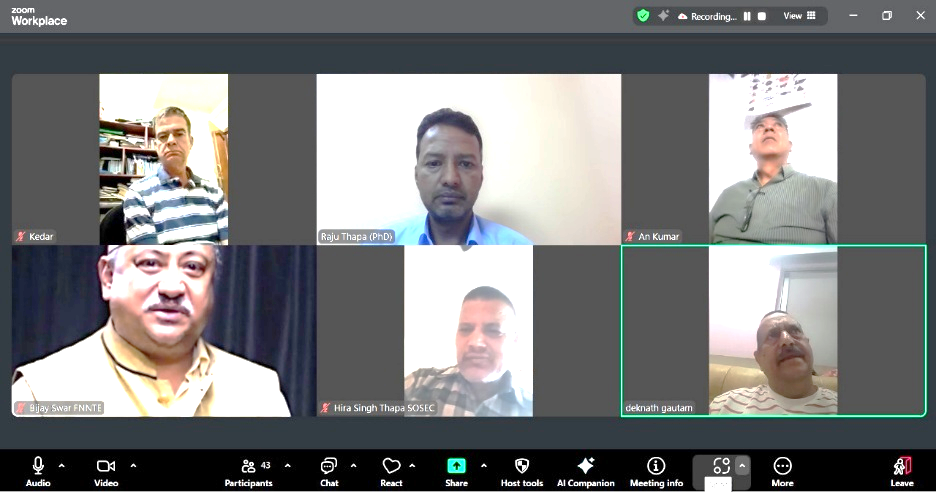Discussion Program on Role of Private Sector in DRR

DPNet Nepal, in collaboration with USAID Tayar Nepal, conducted a Policy Dialogue focusing on Private Investment in Disaster Risk Reduction (DRR) for Resilience today on 12th June, 2023. The event aimed to catalyze collaboration, coordination, and partnerships between private sectors and DRR organizations for constructing resilient communities. The program witnessed representatives from the National Disaster Risk Reduction and Management Authority (NDRRMA), United Nation (UN), Federation of Nepalese Chambers of Commerce and Industry (FNCCI), National Business Initiative (NBI) along with the individuals from other government, non-government and private sector organizations.
Mr. Kailash Rijal, General Secretary of DPNet Nepal, started the dialogue by delineating the significance of private sector engagement in disaster response. He highlighted the need to formally leverage the private sector’s resources and expertise in synergy with DRR rganizations. Mr. Surya Bahadur Thapa, Chairperson of DPNet Nepal, accentuated the importance of stimulating public-private partnerships and employing Corporate Social Responsibility (CSR) transparently and accountably for community resilience.
Technical Expert Mr. Suman Shakya from Tayar Nepal, underscored the vital role of the private sector in DRR throughout his presentation that was titled Policy Dialogue on Private Investment in Disaster Risk Reduction for Resilience. Drawing attention to the economic aftermath of the 2015 Nepal Earthquake, he emphasized that the private sector's exposure to disaster risks is often unaddressed. Mr. Shakya posited that the private sector is integral to the nation's economy, and its growth is indispensable. Highlighting the private sector's stewardship of critical infrastructure and resources imperative for emergency management, he stressed on the necessity of preparedness and resilience. Mr. Shakya noted that while the private sector has been commendable in rendering financial support post-disasters, it is not sufficiently fortified to tackle natural and human-induced diaster due to limited awareness and capacity. He drew attention to the fact that investing $1 in resilience saves $4-7 in response, yet, Nepali businesses are bereft of necessary preparatory apparatus. Mr. Shakya advocated for the government and civil society organizations to build enduring alliances with the private sector, recognizing them as invaluable partners in disaster resilience.
Mr. Kedar Neupane, pinpointed that the private sector's role in DRR resilience should expand beyond fundraising to actively safeguarding and mitigating losses in the private sector. He highlighted the need for risk mapping, auditing, disaster insurance, and community-based DRR mechanisms.
Mr. Pratap Kumar Pathak talked about policy dialogue’s role in facilitating evidence-informed policymaking in his presentation titled A Policy Dialogue on Private Investment in DRR for Resilience Building . He reflected on the capricious and intricate nature of disasters and stressed the necessity of risk-informed private sector investments. He also drew parallels with international frameworks such as the Sendai Framework for DRR.
Dr. Bal Ram Chapagain, Assistant Professor at Tribhuvan University, underscored the importance of private investment in DRR, citing compliance with policies and legal obligations, moral obligations, good governance and risk reduction, and value creation for the private, public, and government sectors during his presentation titled Private Investment in Disaster Risk Reduction for Resilience. Dr. Chapagain voiced concerns that most DRRM endeavors are reactive and are geared more towards emergency response and relief rather than preparedness. He lamented the lack of cross-sector collaboration, improper utilization of CSR funds, and the deficiency in awareness regarding disaster risk financing instruments. Dr. Chapagain pushed for an appraisal and rating system for CSR contributions. He also elaborated on how the private sector could foster resilience through building robust infrastructure, undertaking risk assessments, investing in research and development for early warning systems, employing insurance and risk transfer, creating supply chain resilience plans, employing CSR funds in community-based DRR programs, and engaging in advocacy, knowledge sharing, and collaborations.
The open discussion moderated by Mr. Surya Bahadur Thapa witnessed participants raise issues such as the ambiguity in the functional definition of private sectors, the necessity for well-defined roles, accountability and transparency among contractors, and the importance of enduring alliances. They accentuated the necessity for clarity and awareness about the scope of private investment in DRR. Mr. Dhruba Bahadur Khadka, Under Secretary at NDRRMA, shared various government initiatives in DRR resilience and underlined the importance of reorienting development to focus on DRR priorities.
In his concluding remarks Mr. Thapa said that the event proved to be instrumental in acknowledging the pivotal role of the private sector in DRR and resilience. It indicated the need for fostering collaboration among the private sector, government, and humanitarian organizations for the judicious allocation of resources towards preparedness, mitigation, and response in disaster management, with an overarching goal of reducing economic losses and fostering sustainable development.











